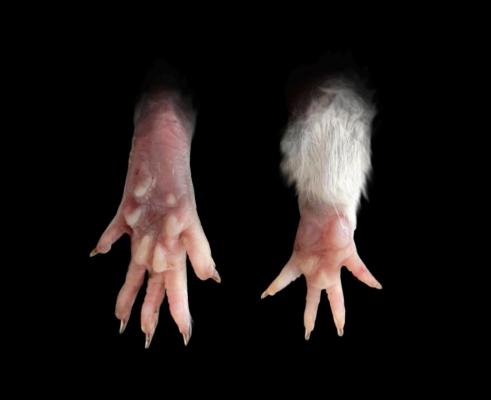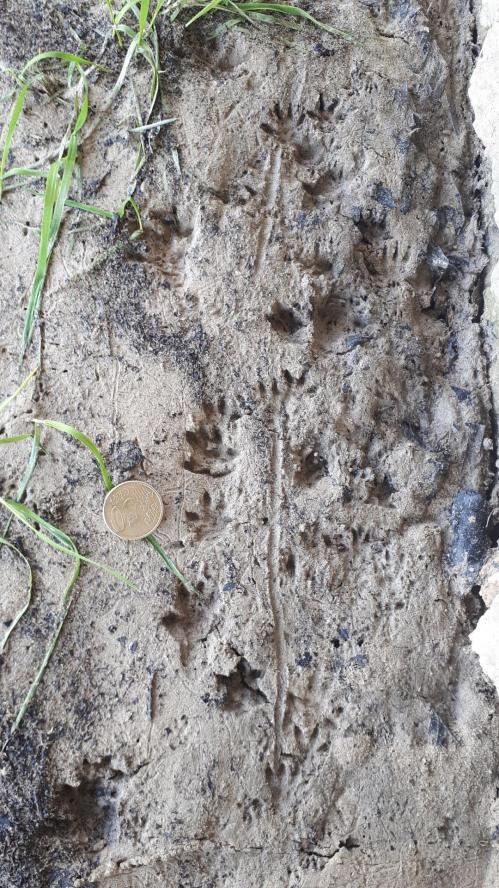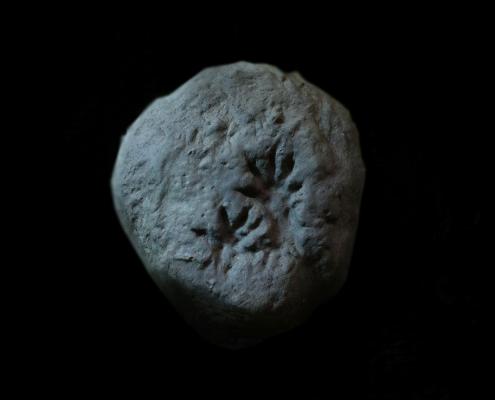Le rat gris, Rattus norvegicus
- Par pisteur
- Le 12/06/2013
- Dans Traces d'animaux et leur biologie / Animal Tracks and Biology
The brown rat
En examinant des traces de ragondin je suis tombé sur un jeu d'empreintes beaucoup plus petites, appartenant au rat gris. Ces dernières se trouvaient sur le bord d'un gué, habituellement fréquenté par les vaches. Le rat gris collectionne les dénominations : rat d'égout, rat brun, rat surmulot. Ubiquiste, il affectionne également les berges de nos cours d'eau au bord desquels ses traces sont très souvent présentes.
PA : 4 doigts visibles, plus petit que le postérieur, en forme d'étoile. Trois pelotes interdigitales et deux proximales.
PP: quatre pelotes interdigitales et deux pelotes proximales, dont une très allongée. Ces dernières ne sont pas toujours visibles car l'impression du PP est souvent partielle. Comme chez l'écureuil, les trois doigts médians sont souvent serrés.
La voie : Le rongeur marche avec un écartement de pied important . C'est un très bon nageur et il n'est pas rare de le voir traverser des ruisseaux à la tombée de la nuit.
It is while searching for coypu tracks that I found these much smaller prints. They were on the verge of a ford usually frequented by cows. The brown rat is given a lot of names, rat d'égout, rat brun, and rat surmulot. Ubiquitous, he likes the edge of river banks, where his tracks are often found.
Front foot: smaller than the rear with 4 visible digits having a star-shaped appearance.Three interdigital pads and two proximal.
Hindfoot: 4 interdigital pads and two proximal, one of which is very elongated. Those proximal pads are not always visible due to the rear foot partial impression. Like the squirrel, the three middle digits are often tight.
Trail/gait: the rodent usually walks with a significant spreading of his feet. He's an excellent swimmer and it's not uncommon to see him crossing streams at nightfall.
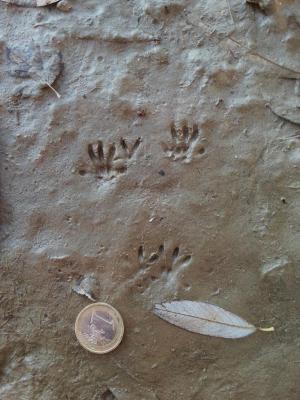
Groupe d'empreintes
L'empreinte du PP est mieux dessinée car le train arrière du rongeur est plus lourd que l'avant.
A contrario, l'impression de l'antérieur est souvent partielle.
Group of prints
The rear print is more defined because the rear end of the rodent
tends to be heavier than the front
Instead, the front print is often partial
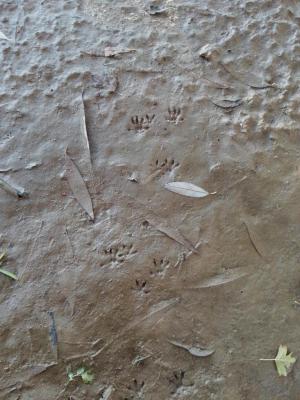
Petits sauts d'exploration
Largeur de la voie environ 6 cm
Ecartement entre chaque groupe d'empreintes : 14 cm
Exploratory bounds
Trail width: 6 cm (2.4 in)
Spacing between each group of prints:
14 cm (5.5 in)
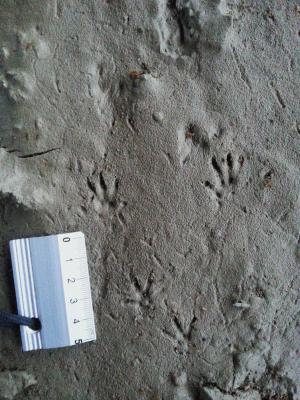
Disposition des mains et des pieds
lors du bond.
Les PP en haut ; les PA en bas.
Front and back feet bounding pattern
Hindfeet on top,
Front feet below
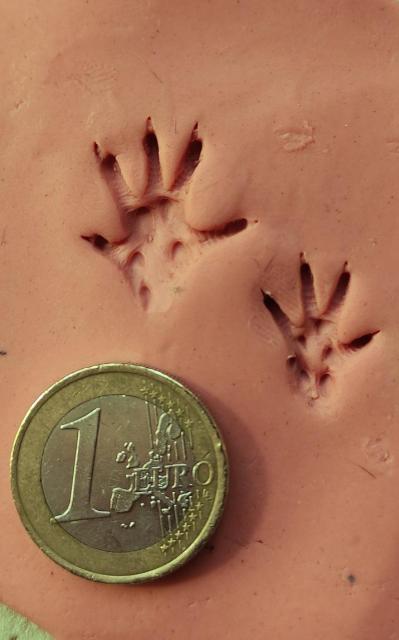 PP à gauche ; PA à droite
PP à gauche ; PA à droite
Hindfoot to the left,
front foot to the right
A gauche PP ; à droite PA
The rodent paws
Hindfoot to the left,
front foot to the right
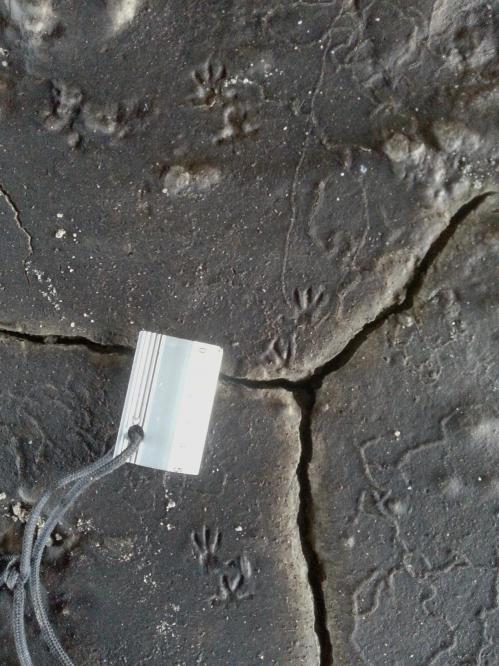
La marche du rongeur
Ici le pied postérieur vient se poser
en avant et à l'extérieur du pied antérieur
Largeur de la voie 5,4 cm,
foulée 18 cm
The animal walking trail
Here the hindfoot lands slightly ahead and
on the outer side of the front print
Trail width: 5.4 cm (2.1 in)
Stride length: 18 cm (7.1in)
On soft mud
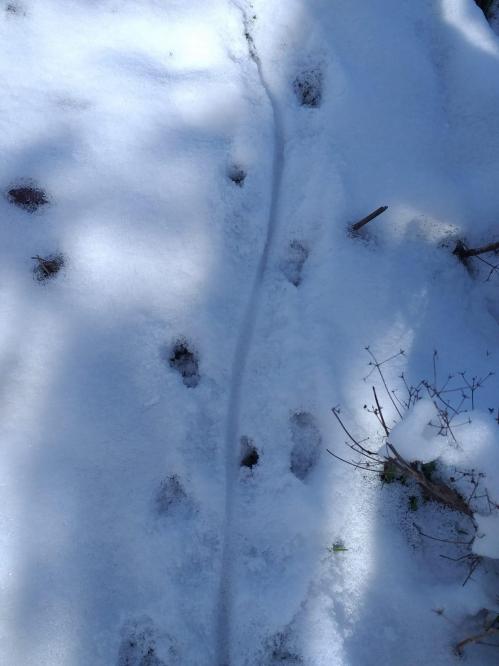
Dans un substrat épais, le sillon laissé par la queue est visible.
In a deep substrate,
the trail leaves a conspicuous groove
Dimensions (L) 3,38 x (l) 2,16 cm.
Cast of the print (Hindfoot)
Size:
(L) 3.4 x (W) 2.2 cm
(1.3; 0.9 in)
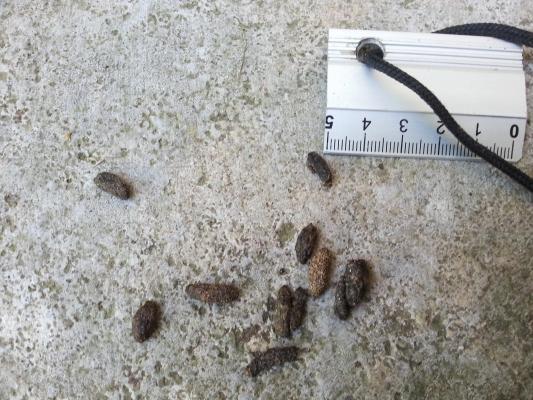
Crottes de jeunes rats gris
Dimensions : (L) 1-1,5 cm x (l) 0,50 cm.
Young brown rat droppings
Size:
(L) 1-1.5 x (W) 0.5 cm
(0.4-0.6 ; 0.2 in)
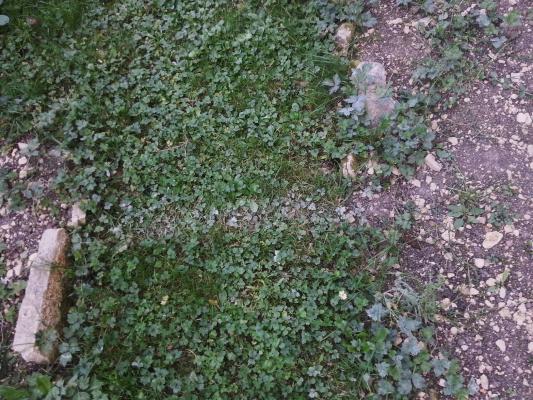
Coulée entre un mur et une mangeoire à oiseaux
Ces stations de nourrissage providentielles
sont vite localisés et exploités par le rongeur.
Path between a wall and a bird feeder
These providential feeding stations are quickly localized
and exploited by the rodent
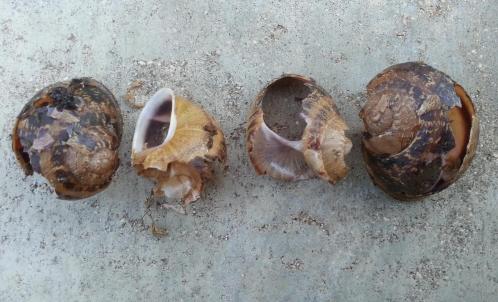
Escargots consommés par le rat gris :
la coquille est "incisée" sur son pourtour
Snails eaten by the brown rat
The shell is cleanly cut
on the periphery
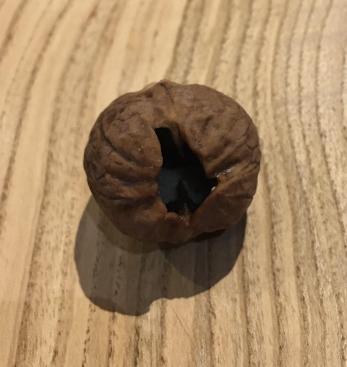 Travail du rongeur sur une noix
Travail du rongeur sur une noix
Les bords de l'entaille sont comme polis
La cavité est étroite,
l'animal semble avoir vidé le contenu
de la noix avec sa patte.
Rodent gnow mark on a nut.
Edges of the notch are smooth-polished looking.
Pit is narrow and it seems that the animal emptied contents using its paw

